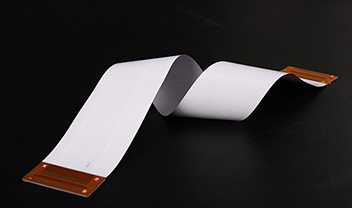What are the differences between FPC and PCB
FPC (Flexible circuit board) is a kind of PCB, also known as "soft board". FPC flexible such as polyimide or polyester film base material is made, with the high density of wiring, light weight, thickness thin, flexible, high flexibility, can withstand the dynamic bending of millions of times and no damage to wire, in accordance with the spatial layout for any move and scale, realize 3 d assembly, components assembly and wire connection integration effect, It has incomparable advantages over other types of circuit boards.

Multilayer FPC circuit board:
application
Mobile phone: emphasis on flexible circuit board light weight and thin thickness. Can effectively save the product volume, easy to connect the battery, microphone, and buttons into one.
Computers and LCD screens: integrated circuit configuration using flexible circuit boards, and thin thickness. The conversion of digital signals into a picture that is displayed on a LCD screen
CD Walkman: emphasis on three dimensional assembly characteristics and thin thickness of flexible circuit board. Turn the huge CD into a good companion to carry around
Disk drive: no matter hard disk or soft disk, all rely on FPC's high flexibility and 0.1mm ultra-thin thickness, complete fast data reading. Whether it's a PC or a NOTEBOOK.
Latest use: Hard disk drive (HDD,hard disk drive) mount circuit (Su printed ENSI). N CIreuit) and XE package board, etc
So, what aspects should FPC continue to innovate from in the future? Mainly in four aspects:
1. Thickness: the thickness of FPC must be more flexible and thinner;
2, folding resistance: can be bent is the inherent characteristics of FPC, the future FPC folding resistance must be stronger, must be more than 10,000 times, of course, this requires a better substrate;
3. Price: At present, the price of FPC is much higher than that of PCB. If the price of FPC comes down, the market will be much broader.
4, technology level: in order to meet the requirements of many aspects, FPC technology must be upgraded, the minimum aperture, minimum line width/line spacing must meet higher requirements.
Therefore, only by innovating, developing and upgrading FPC from these four aspects can it usher in a second spring!
What is the PCB
Printed Circuit Board (PCB) is one of the most important components in the electronic industry. Almost every electronic device, from electronic watches and calculators to computers, communication electronics, military weapons systems, as long as there are integrated circuits and other electronic components, for the electrical interconnection between them, printed boards are used. In larger electronic product research, the most fundamental success factor is the design, documentation, and manufacture of the printed board for the product. The design and manufacturing quality of PCB directly affect the quality and cost of the whole product, and even lead to the success or failure of commercial competition.
PCB circuit boards
The role of the PCB
After electronic equipment adopts printed board, due to the consistency of similar printed board, the error of manual wiring is avoided, and electronic components can be automatically inserted or mounted, automatic soldering, automatic detection, to ensure the quality of electronic equipment, improve labor productivity, reduce cost, and easy maintenance.
The development of the PCB
Printed boards have developed from single layer to double-sided, multi-layer and flexible, and still maintain their own development trends. Due to the continuous development of high precision, high density and high reliability, and constantly reduce the volume, reduce the cost, improve the performance, making the printed board in the future electronic equipment development project, still maintain a strong vitality.
Were reviewed at home and abroad in the future technology development trend of PCB manufacturing is basically consistent, namely to high density, high precision, small aperture, thin wire, small spacing, high reliability, multiple stratification, high-speed transmission, light weight, thin, on the production at the same time to improve productivity, reduce costs, reduce pollution, to adapt to many varieties, small batch production. The technical development level of printed circuit is generally represented by the line width, aperture, and thickness/aperture ratio on the printed board.
conclusion
In recent years, the market of consumer electronic products led by smart phones, tablet computers and other mobile electronic devices has been growing rapidly, and the trend of miniaturization and lightness of devices has become more and more obvious. As a result, traditional PCB has been unable to meet the requirements of the product, so major manufacturers began to study new technologies to replace PCB, and FPC, as the most popular technology, is becoming the main connecting parts of electronic equipment.
In addition, the rapid rise of wearable smart devices, drones and other emerging consumer electronics market also brings new growth space for FPC products. At the same time, the trend of display and touch control of all kinds of electronic products also makes FPC enter a broader application space with the help of small and medium-sized LCD screens and touch screens, and the market demand is growing day by day.
The latest report shows that in the future, flexible electronic technology will drive a trillion market, is an opportunity for China to strive for the leapfrog development of the electronics industry, can become a pillar industry of the country.
Contact: Ms.Huang
Phone: 15023181892(微信同號)
Tel: 0755-23289186
Email: [email protected]
Add: xingye road,14th,bao'an shenzhen city CHINA